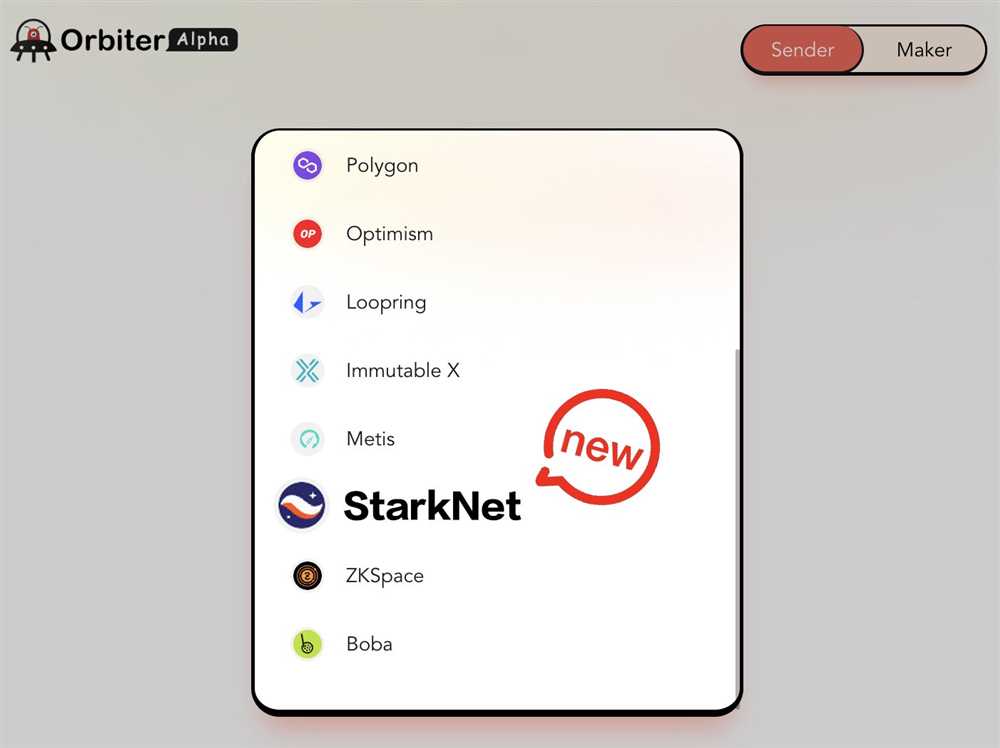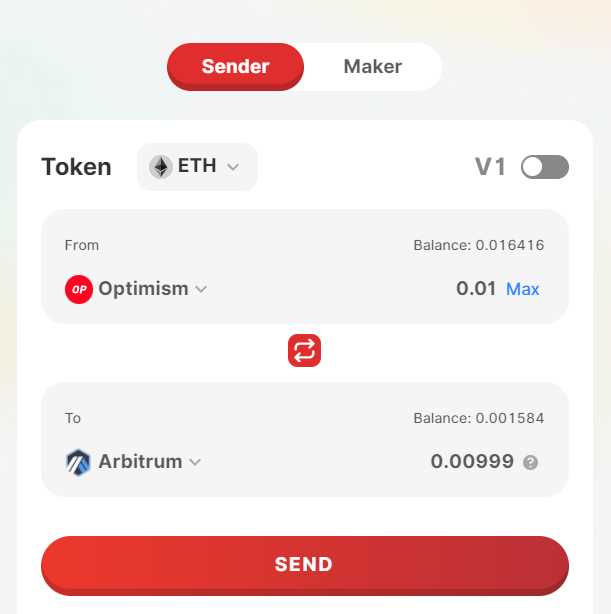
Providing Liquidity for Cross-Chain Transactions in Orbiter Finance: A Deep Dive into Maker’s Role

Discover the power of Maker in the world of Orbiter Finance!
Introducing Maker, the innovative platform that revolutionizes cross-chain transactions.
Orbiter Finance is changing the game by providing seamless liquidity for cross-chain transactions, and Maker is at the forefront of this groundbreaking technology.
With Maker, users can unlock the true potential of cross-chain transactions, ensuring fast and secure transfers between different blockchains. Say goodbye to lengthy transaction times and hello to a new era of financial freedom!
But what exactly is Maker’s role in Orbiter Finance? It’s simple – Maker acts as the bridge between different blockchain networks, allowing users to seamlessly transfer their assets across chains with ease.
Through Maker’s advanced technology and deep liquidity pools, users can experience the fastest and most reliable cross-chain transactions on the market. No more waiting for confirmations or worrying about lost funds – Maker has got you covered.
Join the Maker revolution and unlock the full potential of Orbiter Finance today. Experience the future of cross-chain transactions with Maker and take control of your financial destiny!
The Importance of Maker’s Role

Maker plays a crucial role in the success of Orbiter Finance as it provides the necessary liquidity for cross-chain transactions. The decentralized nature of Orbiter Finance allows users to seamlessly transfer assets between different blockchain networks, and Maker ensures the availability of these assets for trading.
Providing Liquidity

One of the main challenges in cross-chain transactions is the lack of liquidity. Maker addresses this issue by acting as a liquidity provider, ensuring that there are enough assets available for users to trade. This is achieved through a combination of smart contracts and algorithmic trading strategies.
Maker continuously monitors the demand and supply of assets on different blockchain networks and adjusts its liquidity accordingly. By doing so, it ensures that users can easily trade between different assets without experiencing slippage or delays.
Reducing Transaction Costs
Another important role of Maker in Orbiter Finance is reducing transaction costs. By providing liquidity, Maker enables users to trade assets at competitive prices, without the need for intermediaries or additional fees.
This not only makes cross-chain transactions more affordable for users but also promotes greater adoption of Orbiter Finance as a whole. Lowering transaction costs allows more users to participate in the ecosystem, driving liquidity and activity on the platform.
In conclusion, Maker plays a crucial role in ensuring the success of Orbiter Finance by providing liquidity and reducing transaction costs for cross-chain transactions. Its involvement enables seamless asset transfers and promotes a vibrant trading ecosystem within the Orbiter Finance network.
Understanding Orbiter Finance
Orbiter Finance is a decentralized finance (DeFi) protocol that aims to provide liquidity for cross-chain transactions. It is designed to bridge the gap between different blockchain networks and enable seamless and efficient asset transfers.
The core concept behind Orbiter Finance is “maker’s role.” Makers are participants in the protocol who provide liquidity by locking their assets in smart contracts. This liquidity is then used to facilitate cross-chain transactions, allowing users to easily move assets between different blockchains.
By providing liquidity, makers play a crucial role in the smooth functioning of Orbiter Finance. They help ensure that there are always sufficient assets available for cross-chain transactions, minimizing slippage and maximizing efficiency. In return for their contribution, makers earn transaction fees and other rewards.
Orbiter Finance is powered by cutting-edge technology, including smart contracts and decentralized oracles. These components enable secure and trustless transactions, ensuring that users can confidently transfer their assets across different blockchains without relying on centralized intermediaries.
In addition to providing liquidity, Orbiter Finance also offers various features and services to enhance the user experience. These include token swapping, yield farming, and staking, among others. These features enable users to maximize their returns and actively participate in the Orbiter Finance ecosystem.
Overall, Orbiter Finance is an innovative DeFi protocol that simplifies the process of cross-chain transactions and provides opportunities for users to earn rewards. By understanding the role of makers and the technology behind the protocol, users can fully leverage the benefits of Orbiter Finance and explore the possibilities of decentralized finance.
Liquidity for Cross-Chain Transactions
One of the key challenges in cross-chain transactions is the lack of liquidity. In a cross-chain transaction, assets need to be moved from one blockchain to another, often involving different protocols and standards. This can create a bottleneck, as there might not be enough liquidity available on both chains to facilitate the transaction.
Orbiter Finance recognizes this challenge and aims to provide a solution through its Maker’s Role. The Maker’s Role in Orbiter Finance is to provide liquidity for cross-chain transactions, ensuring smooth and efficient asset transfers between different blockchains.
How does Maker’s Role provide liquidity?

Maker’s Role involves the creation and management of liquidity pools on various blockchains. These pools serve as a source of funds that can be used to facilitate cross-chain transactions. The liquidity is provided by users who deposit their assets into the pools, which are then used to support transactions.
When a cross-chain transaction is initiated, Maker’s Role algorithms work in the background to identify the optimal path for asset transfer. This involves analyzing the available liquidity pools on different chains and selecting the most efficient route for the transaction.
Benefits of Maker’s Role in providing liquidity
By providing liquidity for cross-chain transactions, Maker’s Role offers several benefits:
| 1. Enhanced transaction speed | The availability of liquidity on both chains ensures faster asset transfers, reducing transaction delays and improving overall user experience. |
| 2. Increased transaction volume | With sufficient liquidity, more transactions can be processed simultaneously, enabling higher transaction volumes and scalability. |
| 3. Lower transaction costs | Having liquidity readily available on both chains helps minimize transaction fees, making cross-chain transactions more cost-effective. |
| 4. Improved interoperability | Maker’s Role bridges the gap between different blockchains, promoting seamless interoperability and allowing assets to flow freely across chains. |
Overall, Maker’s Role in Orbiter Finance plays a crucial role in providing much-needed liquidity for cross-chain transactions, enabling smoother and more efficient asset transfers between different blockchains.
Deep Dive into Maker’s Role

In the world of blockchain and decentralized finance (DeFi), Maker plays a critical role in providing liquidity for cross-chain transactions. As a decentralized autonomous organization (DAO), Maker operates on the Ethereum blockchain and aims to create a stable cryptocurrency called DAI.
What is Maker?

Maker is a decentralized autonomous organization that operates on the Ethereum blockchain. Its mission is to enable the creation of a stable cryptocurrency called DAI, which is pegged to the value of the US dollar. Maker achieves this stability by using a system of smart contracts and collateralized debt positions (CDPs).
CDPs are a key feature of Maker’s ecosystem. They allow users to lock up their Ethereum assets as collateral and mint DAI against it. The collateralized assets provide stability and security to DAI, ensuring its value remains pegged to the US dollar. In the event that the value of the collateral drops below a certain threshold, the CDP is automatically liquidated to protect the stability of the system.
Providing Liquidity for Cross-Chain Transactions

In addition to its role in creating a stable cryptocurrency, Maker also plays a crucial role in providing liquidity for cross-chain transactions. This means that Maker facilitates the transfer of assets and value between different blockchain networks, such as Ethereum and other compatible blockchains.
By providing liquidity, Maker enables users to seamlessly transact between different chains without having to worry about the underlying technical complexities. This is achieved through the use of decentralized exchanges (DEXs) and liquidity pools, which are powered by Maker’s governance token, MKR.
MKR holders have the ability to vote on important decisions related to the Maker protocol, including the addition of new collateral types, changes to stability fees, and other key parameters. This decentralized governance model ensures that the Maker ecosystem remains secure and adaptable to changing market conditions.
| Key Takeaways |
|---|
| Maker is a decentralized autonomous organization operating on the Ethereum blockchain that aims to create a stable cryptocurrency called DAI. |
| Maker achieves stability by using collateralized debt positions (CDPs) and smart contracts. |
| Maker also provides liquidity for cross-chain transactions through decentralized exchanges and liquidity pools. |
| MKR holders have the ability to vote on important decisions related to the Maker protocol. |
Q&A:
What is the Maker’s role in Orbiter Finance?
Maker’s role in Orbiter Finance is to provide liquidity for cross-chain transactions. Maker ensures that there is enough liquidity available for users to make seamless cross-chain transactions.
Why is liquidity important in cross-chain transactions?
Liquidity is important in cross-chain transactions because it ensures that there are enough funds available for transactions to be completed smoothly. Without sufficient liquidity, transactions may face delays or even fail to go through.
How does Maker provide liquidity in Orbiter Finance?
Maker provides liquidity in Orbiter Finance by depositing funds into the liquidity pool. These funds are then used to facilitate cross-chain transactions. Maker may also earn rewards in the form of transaction fees for providing liquidity.
What are the benefits of Maker’s role in Orbiter Finance?
The benefits of Maker’s role in Orbiter Finance include earning rewards through transaction fees, contributing to a more seamless cross-chain transaction experience for users, and helping to improve liquidity in the platform.
Can anyone become a Maker in Orbiter Finance?
Yes, anyone can become a Maker in Orbiter Finance as long as they meet the required criteria. This may include fulfilling certain token holding or staking requirements, as well as undergoing a verification process.


